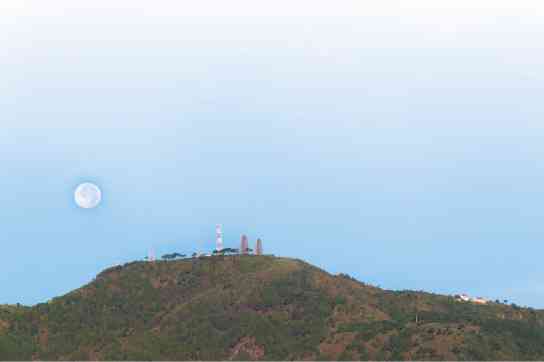
A COURT of Appeals decision rules these radar dishes and satellite antennas to be no threat to the water source and ecology of Mt. Sto. Tomas. RICHARD BALONGLONG/INQUIRER NORTHERN LUZON
BAGUIO CITY—A legislator lost his fight against a court order protecting a forest reservation and watershed in Benguet province from construction and other projects that threaten the area’s water source.
The Court of Appeals (CA) rejected a motion for reconsideration filed by Rep. Nicasio Aliping Jr. against a permanent environmental protection order (Pepo) that the court granted on May 6 to preserve the Mt. Sto. Tomas forest reservation and watershed.
The order fulfilled the writ of kalikasan issued by the Supreme Court in September 2014 over the forest reservation straddling the city and neighboring Tuba town in Benguet.
The appellate court stopped the Tuba government from allowing more settlements, farming and pocket mining in the area. It also stopped settlers, like Aliping, from further building structures in the area.
Aliping had asked the CA to review the Pepo, arguing that it “deprived him of his right over the property,” which he had bought before the area was declared a forest reserve through Proclamation No. 581 dated July 9, 1940.
In his petition, Aliping said depriving him of his right over the land, “including the right to introduce lawful improvements,” violates the legislator’s right to “due process under the 1987 Constitution.”
But in rejecting Aliping’s petition, in a resolution on Oct. 29, the CA’s special former fifth division said protecting the mountain supersedes any property rights, even those being asserted by Aliping.
It said “property rights, though sheltered by due process, must yield to [the] general welfare.”
The writ of kalikasan was requested last year by Baguio-Benguet Bishop Carlito Cenzon, Lingayen-Dagupan Archbishop Socrates Villages and residents of communities relying on a water source on Mt. Sto. Tomas that was polluted by illegal road excavation projects.
The CA held Aliping responsible for the illegal excavation and ordered him to rehabilitate the scarred mountain side.
Aliping disputed this part of the decision, saying no evidence showed he was involved in the project. The CA, however, said it stood by the ruling based on its “factual findings.”
The court also said Aliping was wrong in citing the equal protection clause of the 1987 Constitution in a comparison of his case, and those of vegetable growers in the area, with that of broadcast and telecommunications firms that keep relay stations on Mt. Sto. Tomas.
In its ruling against Aliping, the court said: “He (Aliping) argues that there is no real and substantial distinction why big multibillion-[peso] companies, primarily engaged in profit, shall be allowed to use Mt. Sto. Tomas forest reserve while the respondent and small vegetable planters are prohibited from doing so.”
“For as long as [the relay stations] have beneficial purposes which do not, in any way, impair the forest resources,” these installations are permitted in the reserve, said the court.
It said the kalikasan writ and Pepo were “immediately executory without prejudice to further appeals,” in response to a June 22 inquiry from the Department of the Interior and Local Government.
Aliping on Thursday said he would elevate the case to the Supreme Court. Vincent Cabreza, Inquirer Northern Luzon